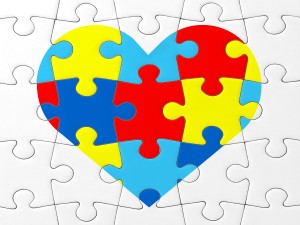National Autism Awareness Month- Know the Signs
In March 2014, the Centers for Disease Control and Prevention (CDC) released updated data on the prevalence of autism in the United States. This surveillance study resulted in identifying that 1 in 68 children have autism spectrum disorder (ASD). The reality of autism is hard for many to comprehend, unless they are raising a child on the spectrum themselves. Today we are going to share with you some signs of autism. The earlier you know your child may have autism, the higher your chance is at working to ensure your child excels in life, regardless of being on the spectrum.

Autism Signs – Baby & Toddler Years
- Not Making Eye Contact: your baby is not looking at you when you are feeding them, meaning that they never engage in moving their eyes to look at you.
- Doesn’t Follow an Object with Eyes: if you are moving an object back and forth but you find your child’s eyes don’t move to follow said object, this can be a sign of ASD.
- No Emotions by Age 6 Months: your baby shows no smiles, and no signs of having any emotional connection by age 6 months.
- No Baby Talk: by age 12 months your baby should engage in babble, also known as “baby talk”. If your baby is not babbling by 12 months that could be a sign of ASD.
- No Spoken Words: unable to speak legible words by age 16 months. A baby should be speaking at some level with words you can understand by age 16 months. Not necessarily full sentences but most certainly comprehensive words.
Autism Signs – Older Child
- Doesn’t Respond to Others Talking to Him/Her: your child seems disinterested in the voice of others or doesn’t respond when others are speaking to him/her.
- Speaks in a Questioning Tone: your child ends each sentence with a tone that sounds more along the lines of asking a question versus speaking a statement.
- Takes Things too Literal: ASD children tend to think in a black & white format, which means they don’t pick up on sarcasm or tone of voice. So if your child tends to take things literally more often than not, they may be on the spectrum.
- Doesn’t Connect with Others: best described as “socially awkward”, ASD children tend to have difficulties connecting with others in social settings. You may find your child has one or no friends because they lack the social etiquette to form bonds with people not on the spectrum.
- Troubles Talking About Feelings: has issues connecting the dots between an incident and the feelings involved. Since ASD children are more literal thinkers they tend to have issues associating feelings with a situation, which can lead to meltdowns.
While each of the autism signs shared in this post reflects the possibility of ASD, we are in no way professionals in the area of autism spectrum disorder. The key to learning if your child may be on the spectrum is to follow your gut instincts. Use this list of early autism signs as a guideline and talk to your pediatrician about any concerns you have regarding the growth and development of your child.
